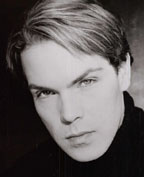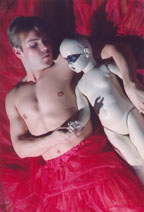|

einer Müller emerged in the 1950s as one of the most remarkable of the disciples of Bertolt Brecht, completing his artistic apprenticeship at Brecht's Berliner Ensemble in East Berlin
where many years later he would be appointed Artistic Director until his death in 1996. In the fifties his plays included works like The Correction (1958) and The Scab (1956), which confronted the
contradictions in trying to build socialism in the context of East Germany.  Those plays relied heavily on the Brechtian model. But with works like The Battle (Scenes from Germany), structurally inspired by Brecht's Fear and Misery in the Third Reich - but revealing a flair for the
grotesque reminiscent of Hieronymous Bosch - and Mauser (an oratorio on the corruption of revolution by its need for ruthlessness) and Quartet (1980) - an adaptation of Les Liaisons Dangereuses which
pre-dates Christopher Hampton's more "loyal" stage and screen adaptations by just under a decade - Müller cast off the tremendous weight of
Brecht - the pillar of modern German theatre - and blazed a new path for himself and the European avant-garde. He also became labelled
as a dissident Marxist under a "Socialist" regime. Nine years after his death, the East German playwright who critiqued both communism and capitalism-remains an influential and controversial author. Those plays relied heavily on the Brechtian model. But with works like The Battle (Scenes from Germany), structurally inspired by Brecht's Fear and Misery in the Third Reich - but revealing a flair for the
grotesque reminiscent of Hieronymous Bosch - and Mauser (an oratorio on the corruption of revolution by its need for ruthlessness) and Quartet (1980) - an adaptation of Les Liaisons Dangereuses which
pre-dates Christopher Hampton's more "loyal" stage and screen adaptations by just under a decade - Müller cast off the tremendous weight of
Brecht - the pillar of modern German theatre - and blazed a new path for himself and the European avant-garde. He also became labelled
as a dissident Marxist under a "Socialist" regime. Nine years after his death, the East German playwright who critiqued both communism and capitalism-remains an influential and controversial author.
Brimming with decadence, poetry, sensuality and wit, the play Vengeance, Bloodlust & Afternoon Tea: Armageddon, Cupcakes
& The Poisonous Love of Heiner Müller's Medeamaterial, Heartpiece, and Quartet by the acclaimed New York company iMind Theatrical Productions and produced, performed and directed by
Cradeaux Alexander is "a journey of evolution that's rife with gender play that begins with barbarism and ends with sophisticated liberation."
Artistic Director of iMind, Cradeaux Alexander was born in Los Angeles and studied theatre at the Lee Strasberg Theatre Institute in
New York. He was a co-founder of the off-Broadway theatre company Studio. Two seasons of shows included Joe Orton's The Ruffian on  the Stair (in the role of Wilson and as Associate Producer), Jean Genet's The Maids (in the role of Claire and as Associate
Producer) and Jean-Paul Sartre's No Exit (Associate Producer). He was Artist-in-Residence for one year with Mabou Mines Theatre Company. As Founder and of iMind,
theatre highlights include the original and adapted productions Home, Funreal, Meditation JoJo, the US stage premiere of Beckett's teleplay Eh Joe and The Heiner Mueller Programme (comprising Medeamaterial and Quartet) at the
Access Theatre, New York. Television includes Oz, New York Undercover, The Guiding Light and Law and Order. the Stair (in the role of Wilson and as Associate Producer), Jean Genet's The Maids (in the role of Claire and as Associate
Producer) and Jean-Paul Sartre's No Exit (Associate Producer). He was Artist-in-Residence for one year with Mabou Mines Theatre Company. As Founder and of iMind,
theatre highlights include the original and adapted productions Home, Funreal, Meditation JoJo, the US stage premiere of Beckett's teleplay Eh Joe and The Heiner Mueller Programme (comprising Medeamaterial and Quartet) at the
Access Theatre, New York. Television includes Oz, New York Undercover, The Guiding Light and Law and Order.
Originally Medeamaterial, Heartpiece, and Quartet, he has entitled the trilogy Vengeance, Bloodlust and Afternoon Tea. The first piece is
a reworking of Medea and the third is based on Les Liaisons Dangereuses, while the central part deals with three surgeons discovering that their patient's heart is actually made of brick.
"They all have an experimental edge," he explains in an interview with "Stage Online" "They all have the idea of playing with gender roles.
I've found the theatre scene over here isn't quite as cutting edge as in the US."
Presented at Theatro Technis in London, I had the chance to talk to the director and performer Cradeaux Alexander to find out more about
this stylised and physical theatre production.
Cradeaux, a few questions about your professional background
I was always interested in performing, since I was 12 in fact, and luckily found myself in schools with interesting drama programs which I
worked and played in until I graduated from high school. This was in Los Angeles, but I thought professional training would be better in New York so I went to study there at the Lee Strasberg Theatre
Institute almost immediately after graduation. It was a great school for me, and a very exciting and disturbing time in my life in general, being
on my own at 17 and 18 and working with professionals quite a bit older than myself, and in New York, no less.
You starred quite successfully in a number of films. At which point in your career did you go from being an actor to
becoming the director, staging Beckett, Genet and Müller?
I met with the avant-garde theatre company Mabou Mines and began to explore different methods of live performance, and I used that time
to find out what I really wanted from the theatre and from my career in general. I began developing new plays and working on them as both,
a director and actor, a combination I continue to explore. I became hooked on Beckett and Genet around this time, and found myself increasingly interested in the avant-garde and the experimental
theatre scene in New York which was definitely alive and kicking with companies including the Wooster Group, Mabou Mines, who I worked with a lot, and Richard Foreman, the Daddy of experimental theatre
there, who I have fond memories of working with on two productions. The whole scene was very conducive to trying new things and finding one's own voice. Eventually I formed my own theatre company,
initially called Negative Antelope then Cx & Company, and with that company staged the premier of a teleplay by Beckett called 'Eh Joe'. That production caused a huge stirring, some absolutely despising
what I'd done with it and others absolutely loving it – and from that point on I knew I was on the right track. I was even threatened with
legal action by the Beckett foundation if I continued with it! This of course only caused me to fortify my resolve.
Many critics were very unkindly disposed toward me and that project, though not all, and I had the feeling that I had touched a very sore
spot among the establishment who considered certain texts and playwrights sacred, an idea I found and still find loathsome to the
extreme. There was definitely a feeling that I had broken a taboo. My Müller project did find some very favourable reviews, I think because it
took them a while to get comfortable with my rather demanding and uncompromising visions, which they chose to find intriguing.
During all this I was still acting in other peoples' productions, in film, television and theatre, and continue to do so. I am after all a
performer, and enjoy working on interesting and/or well-paid projects. Money has always been an issue for me, since I've never had any, and have had to pull many rabbits out of many hats to make anything
happen for myself. Television work particularly, when I could get it, helped me to fund the work I really cared about making.
Müller especially is considered to be a playwright who is very difficult to perform. What made you choose him, and especially
the combination of these three plays?
On the page Müller seems almost impossible. How can one communicate such dense, uncompromising blocks of text (I'm thinking
here especially of 'Quartet') with a sense of clarity or drama? Of course I heard the challenge and had to accept it. Nowhere else had I
found language or ideas so close to what I felt to be my own. While I later began to delve into the ideas and history behind Brecht, the
Berliner Ensemble and of course Müller, all of which I found fascinating, I went into the project initially out of a primal attraction. I also knew he was almost unknown in America, which made him
especially appealing, interested as I am in exploring and presenting 'new' work.
Medeamaterial, Heartpiece, and Quartet is a fascinating combination and coming from a background of Anti-Theatre,
Heiner Müller is an outstanding playwright for me, Brecht's heir and not only politically a more than important personality. You performed the play as "Heiner Müller Program" in New
York in 2002 with a group called "Negative Antelope" or rather "Cx & Company"?
The first time it was presented it was indeed called 'The Heiner Müller Programme' and included just 'Medeamaterial' and 'Quartet'. I chose
them for several reasons, but mainly because I saw a great opportunity in both of them for theatrical experimentation, and a chance to put my own stamp on the work; I also saw a great chance
for gender exploration, a subject close to my heart, and because they are both profoundly feminist, another subject close to my heart, and they seemed to work exceptionally well together as an evening of
theatre. 'It begins with barbarism and ends in sophisticated liberation from the female perspective' is what I think I once wrote about the
programme, and I still hold that to be true. Medea, as I've interpreted Müller's take on her, is an extreme revenge fantasy, a character who has explored and executes the very limits of her nature. These
themes are carried on in 'Quartet' with the character Merteuil and similarly with the other character in the play, Valmont.
 |
I also found it quite probable to explore Müller's Medea as a man, taking to the extreme her proclamation 'I want to rip mankind apart in
two and live within the empty middle, I no woman and no man'. As a man playing this Medea I'm also conscious of the irony of a male person taking on what he and many others considers to be a feminist
work, which I also explore. In 'Quartet' we have a woman completely in control until her final jealousy, which prompts her to act in a kind of
murder. I immediately saw sympathy between the two. The addition of 'Heartpiece' was mostly put in to round out the two longer plays,
and I liked its simplicity, it's dark humour, and how well it tied the two together. Its theme of longing brought up short by a shocking disappointment is definitely in tune with the other two pieces.
At the end of the day I want to work with text which allows me to experiment and present something new, and there's certainly no
chance anyone has seen a version of these plays as I present them, especially as they're by a playwright largely unknown in Britain, or in America, where I first staged them.
German playwrights assault political issues more aggressively than Americans - Büchner, Brecht and Müller not only wrestle
with politics; they do so in provocative ways that shatter conventional dramatic structure. They're willing to slap their audiences in the face and drag them kicking and screaming
into new aesthetic realms. It is Müller's ability to hammer politics into art that explains why he continues to disturb, shock and seduce audiences.
I have read a number of harsh critics of your New York
production that told me it must indeed have been quite disturbing to the American audience.
I have no time for critics. They live off the backs of artists and then have the nerve to impose their personal views on what one has done;
positive or negative. Criticism should be a response to work that further explores it and poses new questions from an outside perspective. The idea that one person's opinion should define for
others if the work is worth seeing is simply beyond comprehension.
You play Medea alone on stage, while the Nurse and Jason are offstage voices, thus making Medea actually the focus point of the scene?
'Medeamaterial' is written mainly as a long monologue delivered by the character Medea. The characters 'Nurse' and 'Jason' only figure
in the extreme opening and ending of the piece. I have further disembodied those smaller characters by making them as voice-overs off stage, as perhaps voices inside Medea's head.
Fascinated by the example of Georg Büchner's famous unfinished play fragment Woyzeck, Müller began writing "synthetic fragments," for
the stage, offering more freedom to directors, choreographers and designers who needed to find new way to attack the material for each new production. A Müller text may retain the same name, but each
production is intended to be virtually a new play: Müller "material" or "Stoff" as the Germans say, sculpted by new hands. He accused
Brecht of having abandoned the portrayal of contradictions for a smoother style and edifying "lessons" in his later works. Thus the
Marxist dissident Müller gained a reputation of being the "anti-Brecht" (The term has more to do with German dialectics than religion
thoughMüller probably delighted in the apocalyptic connotations of this.)
I consider daily life largely disappointing. Most of the time one is worried about money or confronted with extremely non-ideal situations
which one has to navigate, often in the shape of other people as obstructive or uncomprehending obstacles. I've always been an outsider and have never found my true voice in the regular run of
things. Performing was my first taste of life, which was truly ecstatic and fulfilling. When I then found the avant-garde, which I found to be
a heady mixture of art and intellect, I knew that I had found what I was truly looking for. I'm inspired by art, which makes me think, which moves me to places I hadn't thought to look, which challenges my
preconceptions. It's these things I keep in mind when making my plays, and is the inspiring force behind them. I have no manifestos, I
simply need to make provocative work to keep me fully alive – when I find that my work has inspired or moved others as well, and then I'm especially pleased.
"I'm not interested in answers and solutions,» Müller stated in an interview with his translator Carl Weber-another influential
theatre man groomed at the Berliner Ensemble. "I don't have any to offer. I am interested in problems and conflicts" Is this the point where you come in?
To cut the question short: What is the purpose of theatre for you, why do you make theatre, and what do you expect as a response from the audience?
Theatre is a medium which should keep it's medium in mind, by which I mean that it is not television, it is not film, and it should not strive to
put across the same ideas. We are given a great chance when we walk into the theatre to make and be confronted by live art, a real moment-to-moment individual experience. Different people will take
away different ideas from my plays, as they are quite layered and challenging – I have no interest in didacticism, political statements or
moral lessons. I put on view what I consider to be an antidote to daily life and mundane amusements, events that will hopefully inspire reflection.
And finally, what's next for Cradeaux Alexander?
I have a lot of ideas for our next extravaganza, including some original plays, but the company does need funding - any patrons out there?
I'd also like to set up a resident artists programme for people who want to experiment with performance and bring new ideas out into the open.
Vengeance, Bloodlust & Afternoon Tea: Armageddon, Cupcakes & The Poisonous Love of Heiner Müller's Medeamaterial, Heartpiece, and Quartet
Translation by Carl Weber
Designer/Director CRADEAUX ALEXANDER
Executive Producer ROHAN QUINE
Theatro Technis (/www.theatrotechnis.co.uk)
26 Crowndale Road, Mornington Crescent
London, NW1
020 7387 6617
24 March - 10 April
Tuesday to Saturday at 8pm & Sunday performance at 4pm
Tickets: £10 / £8 concessions
Reservations & Tickets:
Email: info@theatrotechnis.com / Tel: 0207 3876617.
Advance bookings: click here to book tickets
|